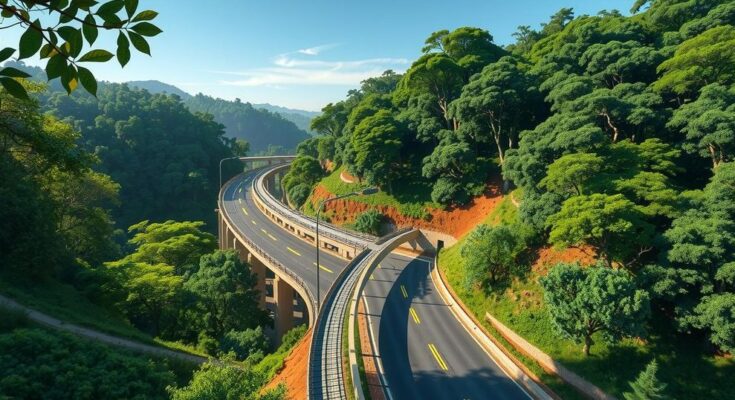Brazil is developing a highway in Belém to facilitate COP30, igniting debates over the environmental impact on protected rainforest areas. Local improvements are contrasted with the lost livelihoods of nearby residents and ongoing ecological degradation, raising questions about sustainable development.
Brazil is undertaking preparations for the upcoming COP30 climate conference in November, which will occur in Belém, a city known as the gateway to the Amazon River. Key developments include a new central square equipped with a metal walkway, kiosks, rain gardens, event spaces, and enhancements to the city’s infrastructure such as rainwater drainage and a clean energy system.
However, the decision to construct a four-lane highway through thousands of acres of protected Amazon rainforest has sparked significant controversy. This highway, Avenida Liberdade, aims to ease anticipated traffic from the conference, which is expected to attract over 50,000 participants, including world leaders and activists.
The Avenida Liberdade will span 13.3 kilometers with dedicated lanes for cyclists and ecological paving, and its construction is reportedly 20 percent complete. Local Vice-Governor Hana Tuma praised the project as a transformative initiative for Belém and its metropolitan area.
Conversely, residents like Claudio Verequete expressed their dismay, emphasizing the negative impact on their livelihoods due to loss of berry harvesting opportunities without any governmental compensation provided. Meanwhile, some locals are optimistic about the city’s improvements and increased commerce, as noted by business owner Dalci Cardoso da Silva.
Prominent figures in the state government, such as infrastructure secretary Adler Silveira, have heralded the highway as an essential and sustainable mobility project. Public sentiment remains conflicted, with media highlighting the irony of constructing such a highway within a protected environmental area established in 1993, which prohibits destructive activities that could harm the ecosystem. Satellite imagery has confirmed ongoing construction within this designated protective zone, raising ecological concerns.
In summary, Brazil’s construction of a new highway in Belém raises significant ethical and ecological questions in the context of the COP30 climate conference. While local authorities argue it serves vital transport needs, the project’s impact on the rainforest and local residents’ livelihoods cannot be overlooked. The juxtaposition of urban development against the backdrop of environmental protection highlights critical issues surrounding sustainability and governance.
Original Source: nationalpost.com




